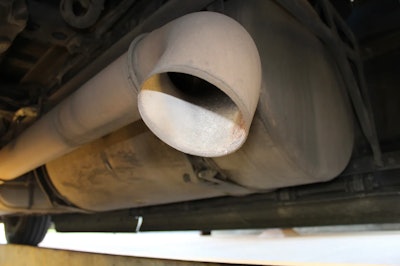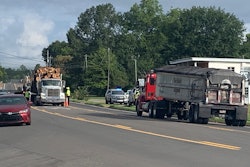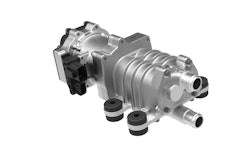
People who have been getting big checks for reporting idling trucks in New York City stand to get even more money as a bill there seeks to expand citizen reporting to parking offenses.
New York City’s Citizens Air Complaint Program kicked off in 2019 and since then has paid citizens big bucks for reporting commercial trucks, buses and vans that violate the city’s three-minute idle law.
All that’s required is video footage of a commercial vehicle (diesel or gas only) that’s shown idling for more than three minutes. Citizen cops get 25% of the fines collected from NYC's Department of Environmental Protection.
Last year, 12,267 submitted videos resulted in checks totaling $724,000 for this quasi-law enforcement cell phone brigade, and that brigade may be growing as a bill seeks to expand the list of offenders to include parking offenses.
Bill 501-2022 proposes extending that 25% take on a fine to citizens who get photos or video of a vehicle “within a radial distance of 1,320 feet of a school building, entrance or exit in a manner that obstructs a bicycle lane, bus lane when bus lane restrictions are in effect, sidewalk, crosswalk or fire hydrant.”
[Related: Trucking experts talk emissions reduction, sustainability planning]
 It may take more than a rebel yell to get more followers for the NYC Idling Twitter page launched earlier this year by the New York City Department of Environmental Protection. Six followers dropped down to five this week. In February of 2020, NYC Mayor de Blasio's office announced that he had "joined rock star and environmentalist Billy Idol to announce a new anti-idling advertising and publicity campaign."NYC Department of Environmental Protection
It may take more than a rebel yell to get more followers for the NYC Idling Twitter page launched earlier this year by the New York City Department of Environmental Protection. Six followers dropped down to five this week. In February of 2020, NYC Mayor de Blasio's office announced that he had "joined rock star and environmentalist Billy Idol to announce a new anti-idling advertising and publicity campaign."NYC Department of Environmental Protection
“The idling program at DEP has been a tremendous success,” Restler told PIX 11 News. “We want to empower New Yorkers to hold people accountable.”
Not all government agencies are on board for citizen law enforcement, however. Both the New York City Police Department and New York City Department of Transportation have voiced concerns at city council meetings regarding the safety of citizens who turn in traffic offenders.
The lure of easy money and the notion of reducing air pollution, however, has convinced some to keep taking their chances.
“Every time I go out of my house, I am prepared for an assault,” environmental attorney Ernest Welde, who doubles as an ICS participant, told CNBC. “You have to go out expecting there’s going to be a confrontation.”
Welde said truck drivers objecting to his video law enforcement efforts have chased him off, thrown punches at him and even pushed him.
Eighty-one-year-old Paul Slapikas told CNBC that he’s been threatened with a knife three times while hunting for idling trucks, yet he kept on filming and submitting complaints, which resulted in a trove of checks from the DEP totaling $64,000.
In a Bloomberg video posted at New York City’s Environmental Protection Twitter page, NYC Idling, which features longtime rocker Billy Idol, former Wall Street banker George Pakenham talks fondly of his retirement gig.
“I’m in the money! A $500 check right here!” he exclaims while holding up the check.
Pakenham said he’s made about $40,000 through the Air Complaint Program and that he knows of “colleagues who make over $100,000 a year.”
At the beginning of the Bloomberg Quicktakes video, Pakenham is shown on a New York City sidewalk placing his hand just an inch or two below the exhaust pipe of a delivery van.
“It’s a little bit like hunting,” he says.
The Air Complaint Program does include some exceptions for idling such as trucks needing to run their engine to power a liftgate, crane, pump, drill, hoist or mixer. Reefer trucks also get a break when idling is necessary to keep their products cool. However, there’s a caveat to that.
“If you submit a complaint regarding a refrigeration truck, you must document that the engine that moves the vehicle was on and was not being used to run the refrigeration unit,” states a directive posted on the Air Complaint Program’s website.
Buses are also permitted to idle when loading and unloading passengers and when the temperature drops below 40 degrees Fahrenheit to allow for heater use so long as the bus is occupied.











